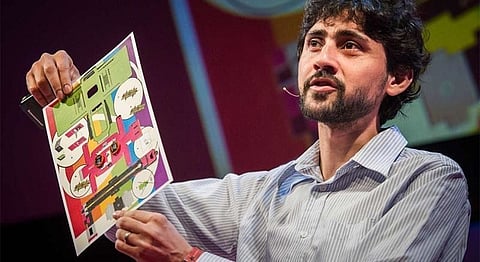
- HOMEGROWN WORLD
- #HGCREATORS
- #HGEXPLORE
- #HGVOICES
- #HGSHOP
- CAREERS
- ABOUT US
- CONTACT US

Sometimes humanity is blessed with a ridiculously useful invention. We all remember the enormous, clunky microscopes from science class - the bulky bugger that looked more like a murder weapon Colonel Mustard would use to knock off Mrs. White in the Green Room, instead of a scientific tool. So with those behemoths in mind, could you fathom a microscope made almost entirely of paper, that costs less than a dollar to manufacture? Sounds like a cheap toy manufactured by an overworked, child labourer, right?
Actually, that couldn’t be further from the truth. This little device, which can survive a three story drop or being stepped on, was born in Manu Prakash’s laboratory at Stanford University. Manu and his PhD student Jim Cybulski created this revolutionary foldable microscope as a response to the persistently elephantine and broken microscopes they were often forced to work with while conducting remote research.
Their brainchild resulted in an extraordinarily low-cost scientific tool that has already been used to ‘identify the microscopic eggs of agricultural pests in India and to catalog the biodiversity of soil arthropods in the Amazon, detect fake currency and medicine, follow toxic blooms, detect bacteria in water samples, map pollen diversity in a city landscape,’ among many other useful applications, according to Foldscope Instruments.
Ladies and gentlemen, a round of applause for the ‘Foldscope’.
During the invention’s pilot phase in 2014, Manu and Jim distributed over 60,000 Foldscopes to 135 countries, helping this creation become one of the most positively disruptive additions to widespread scientific awareness and discovery. Foldscope Instruments’ 2017 goal is to distribute a million of these microscopes across the globe. With Foldscope Instruments’ open sharing platform (Microcosmos), this sizeable and diverse pool of Foldscope users can upload images of their scientific discoveries, so the entire community of Foldscope users can enjoy each others findings.
As the inventors put it, “We believe that every kid in the world should carry a microscope in his/her pocket…just like a pencil.” Although to be fair, before this we knew of no ‘pencil’ that could ‘utilize a 2.38 mm borosilicate glass lens, which provides 140x magnification and 2 micron resolution.’ The latest Foldscopes being distributed can even ‘distinguish red blood cells and...watch live bacteria.’
The sheer number of applications that are possible on this master of tools, speaks waves of empowerment across the planet. Rural communities often disenfranchised from scientific exploration are now able to accomplish a myriad of tasks with this low-cost creation. For example, one can ‘observe biological samples like bacteria, copepods, tardigrades, tetrahymena, diatoms, rotifers, nematodes, spider eggs, ants, vorticella, mites, daphnia...pretty much anything you can stick on a slide. Foldscope can also allow the observation of non-biological samples, such as particulates detrimental to air quality, or the microscopic crystalline differences between real and fake medications,’ as stated by Foldscope Instruments.
All of that is just the tip of the scope, for Manu and Jim’s vision is anything but myopic. Manu has already created a five dollar chemistry set that can be used to provide cost-effective medical diagnostic tests, examine water quality, determine soil chemistry for farmers, as well as moonlight as a snake bite venom test kit.
A mind like Manu’s is reassuring not only in terms of forward thinking, but he’s also using his skills and ingenuity to provide opportunities and tech to people who otherwise wouldn’t have access to such resources – and that is pretty much as all-inclusive as you can get. With a utilitarian eye for radical design Manu’s Foldscope bridges the sizable gap between the knowledge held by the lupine proletariat and white-cloaked lab jockeys.
If you liked this article, we suggest you read:
